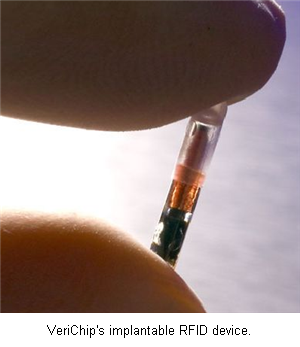VeriChip goes consumer with its implantable RFID chips; Would you buy?

VeriChip said Tuesday it will begin pitching its implantable RFID chips directly to consumers in a move that aims to link doctors directly to personal health records. 
VeriChip said it will launch a direct-to-consumer marketing campaign in South Florida on April 28. The general idea appears to be to woo a bunch of retirees to implant an RFID chip (right) and connect the information with personal health records. VeriChip will pitch its wares through HEARx hearing aid stores in the Palm Beach area.
Rest assured the idea of implantable RFID chips will freak a few folks out. However, I see RFID as a key component to personal health records, which are patient controlled medical data repositories. Microsoft (HealthVault resources), Google (Google Health resources) and others have pitched personal health records and the idea makes a lot of sense. The problem: What happens if I'm in a car wreck and can't tell the doctor my log-in and password? What if my personal health record on a portal doesn't synch up with a hospital's IT systems? Will I actively manage my personal health record?
Simply put, personal health records (PHRs) have their limitations and an RFID chip could expand their use. It would be a lot easier if I were implanted with an RFID chip that could be read when I pass through the doors of the emergency room. Could this RFID chip be hacked? Possibly. But in real world use an implantable RFID chip used for medical purposes makes a lot of sense to me.
Also see: Dana Blankenhorn's health care blog.
- Cutting to chase of Personal Health Record debate
- Healthline leading PHR race
- Will privacy keep Health 2.0 from the starting gate?
- Microsoft HealthVault is nothing like Google Health
VeriChip will hook up its chip with its patient ID system called Health Link. In a statement VeriChip says:
Health Link is the connection between you and your personal health record. It provides emergency room doctors and nurses with immediate access to your vital medical and emergency contact information, which will help them to treat you rapidly, accurately and safely during an emergency. Health Link utilizes a tiny microchip (similar in size to a grain of rice) and a secure, private, online database that links you to your personal health record. Your Health Link is always with you and cannot be lost or stolen.
The Health Link microchip stores only a unique 16-digit identification number and is injected just under the skin in the rear upper portion of the right arm. When a Health Link member presents in an emergency department unconscious, unresponsive or confused, emergency medical personnel use the Health Link scanner to retrieve the member’s identification number to access his or her personal health record.
On paper, VeriChip's idea makes sense, but it would be nice if the RFID chip could synch with multiple personal health record systems.
The big question here is whether VeriChip can market this implantable RFID chip in a way that's palatable to consumers. Would you go for this?
More reading: